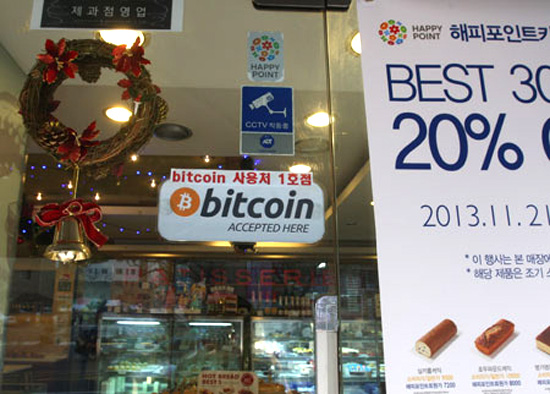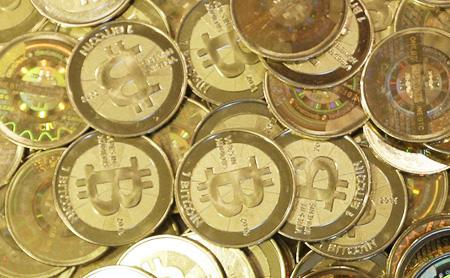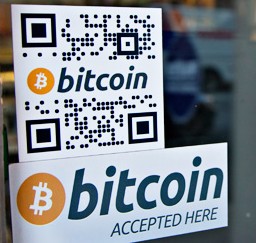- California Assembly OKs highest minimum wage in nation
- S. Korea unveils first graphic cigarette warnings
- US joins with South Korea, Japan in bid to deter North Korea
- LPGA golfer Chun In-gee finally back in action
- S. Korea won’t be top seed in final World Cup qualification round
- US men’s soccer misses 2nd straight Olympics
- US back on track in qualifying with 4-0 win over Guatemala
- High-intensity workout injuries spawn cottage industry
- CDC expands range of Zika mosquitoes into parts of Northeast
- Who knew? ‘The Walking Dead’ is helping families connect
Should Korea embrace Bitcoin?
BOK in dilemma over how to handle virtual currency

A sign reading, “We are the first to accept Bitcoin,” is posted on the door of a bakery shop in Incheon. The bakery is the only store in Korea that accepts the virtual currency, but many more may follow suit. (Yonhap)
By Na Jeong-ju
Koreans are showing growing interest in Bitcoin since a bakery shop in Incheon started accepting the virtual money, just like cash and credit cards, on Nov. 1.
The bakery shop is the first ㅡ and as of yet only ㅡ store in Korea for Bitcoin users, but the currency is already being increasingly used in stores and online shopping malls worldwide.
Koreans can trade Bitcoin in an online exchange market named Korbit, which was established in April. The volume of transactions there is still much lower than those in other countries because using the currency is still considered a joke by many Koreans.
However, more shops here may accept Bitcoin as a means of payment because its transaction fees are lower than credit cards.
The local stock market is already in the grip of Bitcoin fever.
The stock prices of some computer equipment manufacturers have soared for the past few weeks on rumors that their sales will jump if Bitcoin becomes popular here.
For example, JC Hyun System has seen its share price more than double since late November just because one of its subsidiaries is a business partner for a Taiwanese firm that produces computer main boards tailored for Bitcoin transactions.
The price of 1 Bitcoin on the Korbit market has surged to over 1,200,000 won from 100,000 won in April in line with soaring global prices.
Early this year, Bitcoin was traded at $13.50 in the U.S., but its value has jumped to over $1,000, prompting debate about its safety as an alternative payment method and the bubble created by reckless investments by individuals.
“Bitcoin uses cryptography and is managed by a network of computers all over the world, so it’s virtually impossible to copy or spend the same coin multiple times,” Korbit director Kim Jin-hwa said in a recent radio program. “All Bitcoin trades are revealed to computer users on a real-time basis, so it’s a more transparent method of payment than cash or gold.”
The Bank of Korea (BOK) is now in a dilemma over the virtual currency.
During a National Assembly audit session in October, BOK Senior Deputy Governor Park Won-shik said the bank won’t recognize Bitcoin as a legitimate currency.
“The coin cannot be acceptable in Korea due to its price volatility and risks it poses. It cannot be an alternative currency,” Park said, after being asked by a lawmaker about BOK’s views on Bitcoin.
That’s in stark contrast to the U.S. Federal Reserve’s positive comments about Bitcoin.
The Federal Reserve said in a report, “Virtual currencies like Bitcoin have legitimate uses and should not be banned.”
The Federal Bureau of Investigation (FBI) also said earlier in a letter to a Senate committee that it recognized virtual currencies offered “legitimate financial services” but they could be exploited by “malicious actors.”
In October, the world’s first Bitcoin ATM was set up in Vancouver, Canada ㅡ the machine allows users to exchange Bitcoins for cash and vice-versa.
China has actively embraced the currency. It now has the largest transaction market in the world. Baidu, one of the country’s largest Internet firms, has allowed its users to pay for its services with Bitcoin.
Against this backdrop, BOK appears to be softening its stance on Bitcoin.
“We will soon unveil our comprehensive report on virtual currencies, including Bitcoin,” said a BOK official. “We are paying attention to speculative Bitcoin trading, and the negative impact a crash may have on the economy. We are also considering the global trend and people’s changing perception of the cyber money.”














